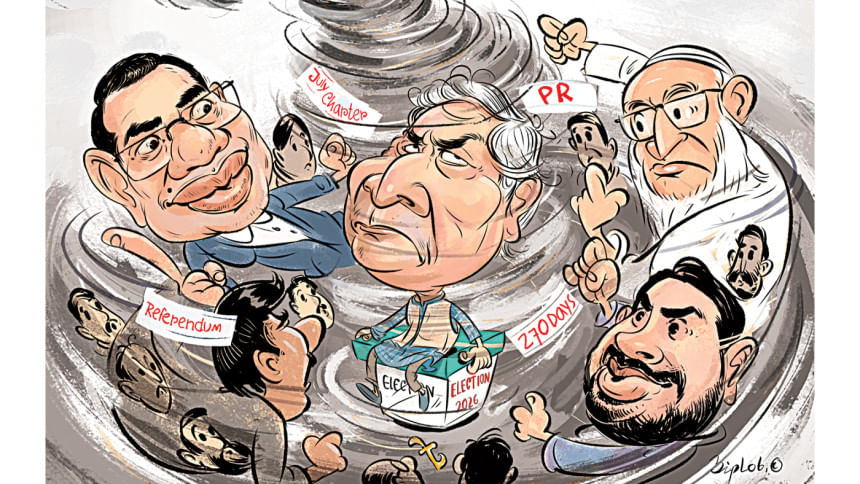The government is weighing a step back from its move to amend article 20 of the RPO, a fresh change that will allow parties in an alliance to contest polls with a common symbol, according to highly placed sources.
However, Jamaat-e-Islami, National Citizen Party, and Khelafat Majlish yesterday warned that reversing the amendment decision would compromise electoral neutrality and unfairly advantage a particular political force.
The amendment, approved at an advisory council meeting chaired by Chief Adviser Prof Muhammad Yunus on October 23, made it mandatory for each party in an alliance to contest polls with its own symbol, not a common one.
It intended to give voters a clearer idea of each candidate's party identity. No gazette on the amendment was issued.
According to the sources, the interim government is preparing to undo the amendment to article 20 of the Representation of the People Order (RPO).
Sources said the reconsideration followed an informal meeting at the state guesthouse Jamuna on Saturday night, where the chief adviser reviewed the political situation and election preparations with several advisers. The decision came at the chief adviser's initiative, the sources added.
The BNP has been opposing the amendment. In a letter to Law Adviser Asif Nazrul on October 25, its Standing Committee Member Salahuddin Ahmed said the change was made without consulting key stakeholders and undermined the democratic rights of alliance partners.
The party demanded the retention of the previous provision that allows alliance partners to run with a common symbol.
The debate comes amid deepening tensions over the timing of the referendum on July charter reforms and the methods to implement them.
Following an advisory council meeting on October 29, Adviser Asif Nazrul told reporters the government was struggling to find a way forward amid firm and conflicting positions of political parties.
'NEUTRALITY AT STAKE'
In a letter to Asif Nazrul yesterday, the NCP alleged the law adviser had assured the BNP of reversing the amendment, saying such an act would compromise the government's neutrality.
"We want to remind you that you are a neutral law adviser of the state, not a representative of any political party," read the letter signed by NCP Member Secretary Akhter Hossen.
The party argued that when a registered party contests under another's symbol, it bypasses its own registration obligations, weakens the Election Commission's authority, and obscures a candidate's identity.
It warned that rolling back the amendment would foster "proxy candidacies", artificially inflate multiparty representation, echo dominant voices in parliament, and undermine genuine pluralism.
Akhter urged the adviser to clarify the government's official position on the issue.
The adviser did not publicly react to the allegation that he had secretly assured the BNP of meeting its demand. The Daily Star tried to reach him for comments, but he did not respond to phone calls or reply to WhatsApp messages.
'UNDEMOCRATIC'
Jamaat Secretary General Mia Golam Porwar said scrapping the amendment would disrupt the level playing field and reflect a secret understanding between the government and a political party.
He suggested the move stemmed from a "gentleman's agreement" between a BNP leader and an adviser. He called it undemocratic.
Undoing the change months before the election would raise questions about fairness, he said.
"If a responsible political leader and a government adviser collude to disrupt the level playing field, a neutral election will become impossible," he said.
In a joint statement, Khelafat Majlish Ameer Maulana Muhammad Mamunul Haque and Secretary General Maulana Jalaluddin Ahmad said revising the RPO to favour a party would be politically unethical, it would destroy fair competition, and push the state towards uncertainty.
They warned such "secret understandings" could fuel public unrest.
The people, they said, want competition and the right to vote, not an election staged to benefit one party.
Meanwhile, Amar Bangladesh Party Chairman Mojibur Rahman Monju said altering an amendment just after approving it would mean the interim government lacked a principled stance.
At a discussion in Dhaka yesterday, he said, "It [government] runs to the right under BNP's pressure, to the left under Jamaat's, and sometimes upward under NCP's.
"Leave the politics of trying to please a few parties. If you don't, you will be permanently accountable to the people of Bangladesh for wasting the opportunity you've been given," Monju added.
Referring to disagreements following the National Consensus Commission's recommendations on implementing the July charter, Monju said the state now faces a deepening crisis over three questions: whether to hold the referendum on the same day as the national election or earlier, how to treat notes of dissent, and the nature of the upcoming polls.

